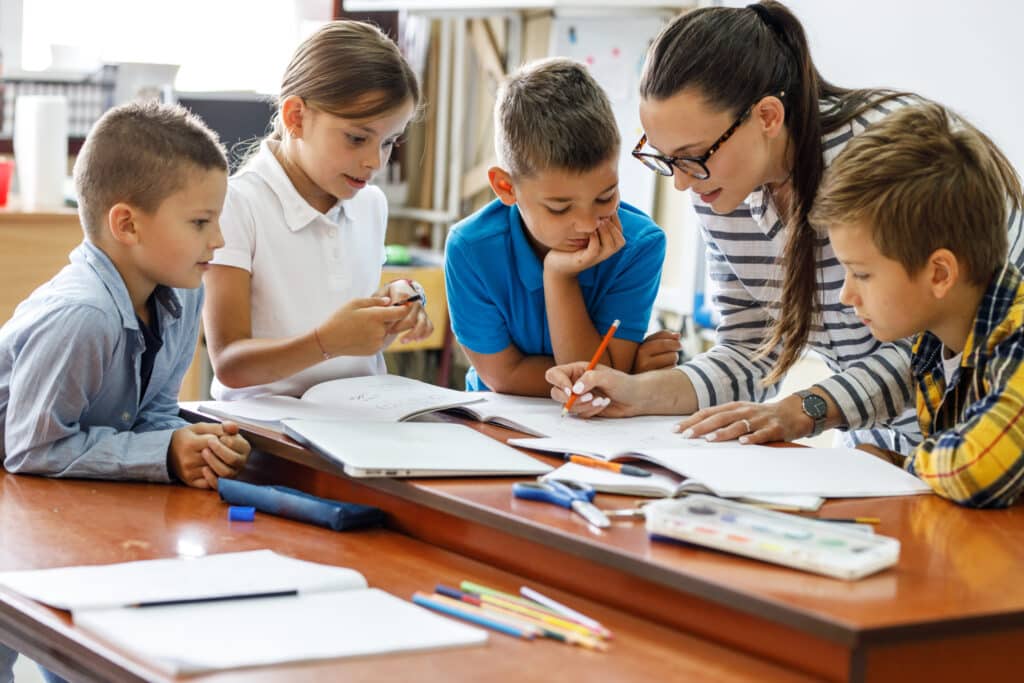Teachers and students share one thing: the nervous jitters on the first day of school.
Think about it. Teachers have to set up set up their classroom, learn the names of 100+ students, and plan a year’s worth of engaging lessons while students have to think about learning a new school, making new friends, and meeting new teachers – not to mention the unknowns of new coursework.
No matter what, students and teachers are both bound to have their own concerns about the first day of school.
Here are six things that kids need this school year – these key insights will help teachers make this back-to-school season better for students (and teachers too!)
1. Communicate with Parents
Communicating is the BEST thing a teacher can do, especially when it’s about a student’s learning style or behavior.
But it’s important to note that neither parents or teachers like to be overwhelmed with emails. So try grouping communication to make it easier.
- Share a monthly calendar
- Send a weekly assignment email
- Post updates on school resources like Schoology, School Messenger, and Google Classroom, Etc.
- Designate days for email communication
- Call parents during the evening
- Or write short notes that students take home
Remember, teachers actually see students more than parents see their own kids. That’s why it’s always important for teachers to communicate as much as possible! But don’t just talk about bad news or assignments. Share goods news too!
If a student performed poorly on an assignment, has trouble making friends, or said something inappropriate in class, a parent needs to know.
Plus, students appreciate their teachers more when they notice their strengths.
The more teachers communicate, the better learning experiences they create.
2. Provide Consistency
Kids need consistency and structure now more than ever!
Every student remembers the back-to-school activities on the first day of school. And who can blame them?
The activities are great, everyone laughs, and almost all the students forget that they are back in school. That is, until the students learn about rules, procedures, consequences, procedures, and policies of the classroom.
But remember, those rules of engagement are the most important thing the students learn on the first day of school. It sets expectations for the remainder of the school year.
Believe it or not, what kids enjoy most about school is consistency.
When kids know the rules, policies, and procedures – and when they know the consequences for breaking them – they understand they can trust their teacher to keep them safe. They learn to predict the outcome of every day, while these standards help contribute to a positive, safe and stable learning environment.
Plus, they respect the teacher more for setting clear boundaries and expectation.
3. Generate Excitement
The ability to generate excitement is a gift that the best teachers have, and it’s a tool to use wisely whenever possible.
- Get kids talking
- Get kids moving
- Use technology
- Learn something new (on the spot)
- Play a game in class
- Ask interesting questions (to push learning further)
- Look at a picture
- Take a walk as a class
- Take the lesson outdoors
- Collaborate with other classes
- Develop a special project
- Or, honestly, give them some free time. (They need it, and so do teachers!)
Excitement creates a fun classroom! Inspire students by getting them excited about learning.
4. Discipline if Necessary.
Every day brings challenges, and teachers see (and learn) something new each day.
That’s why discipline is part of the learning process: parents want their children to learn the difference between right and wrong.
If a student does something that deserves a consequence, provide one.
The student will learn to adjust the behavior, and the classroom will become a safer environment for the students and teacher alike.
Not to mention, parents and other teachers will appreciate it later when the behavior is no longer an issue at home – or in class.
5. Make the Students Your First Thought.
It’s a lot of responsibility being a teacher.
Remember, students are their parents’ worlds. Everything parents think, believe, and dream is for their children.
So…make sure every action, thought, and activity has the students in mind. When making the lesson, ask questions such as:
- Are my students going to enjoy this?
- Are my students going to learn from this?
- Would I like this activity if I were the student?
- Is this actually engaging?
- Is this lesson easy to teach?
Answering these questions will help determine the true objective of the lesson.
Not to mention, having a student-first mindset makes talking to parents easier.
Instead of approaching the situation as if the student is doing something wrong, approach it with the student in mind by saying something like:
- “I’m worried about Kevin’s grades.”
- “I’m concerned about Aaron’s behavior.”
- “I want to help Sarah adjust to 6th grade”
These responses show that care and concern are the priority rather than the student’s behavior.
And when in doubt, ensure the parent that you care about their child—that’s what matters most, and that’s what they need to hear.
6. Don’t Just Teach Content!
Teachers have a lot of curriculum to teach, but they must also:
- Read the state standards
- Make unit plans
- Design lessons
- Plan activities
- Make lesson materials
- And many more things along the way.
It’s not an easy job, but the best teachers give it their all.
But students don’t want to learn about the subject matter—they have too!
They want to learn about each other, including their teacher. Many life-changing conversations can happen in the classroom and students shouldn’t miss these lessons. Students may be curious about the teacher’s life outside of the classroom, including the challenges they faced, the friends they made (and lost), and the mistakes they made. A relatable teacher is an approachable teacher.
Be real with the students!
Kids need to learn the content—we all know that!—but kids learn the most from teachers that they see as human beings, not robots! They learn the most when they learn about life, the value of being a human, including what they can do to grow and mature each day.
A Successful School Year
Every first day of school is going to have its challenges for both teachers and students.
But as parents and teachers, it’s our responsibility to assuage these concerns.
For more content related to back to school and back to school tips for parents, click here.
To learn more about the Arise Platform and how you can have the flexibility to be more involved in your child’s school activities, visit newawfhstg.wpengine.com.





